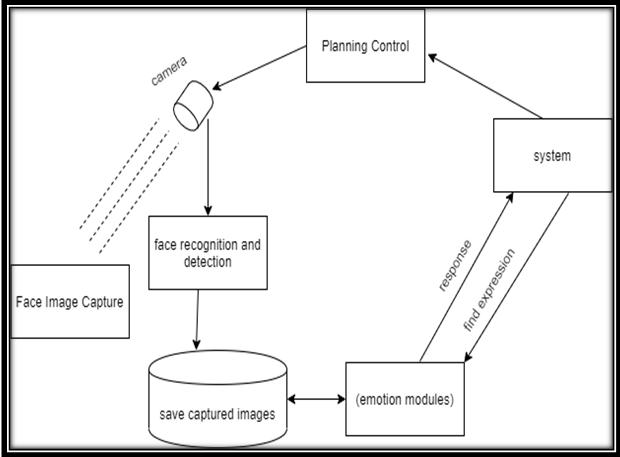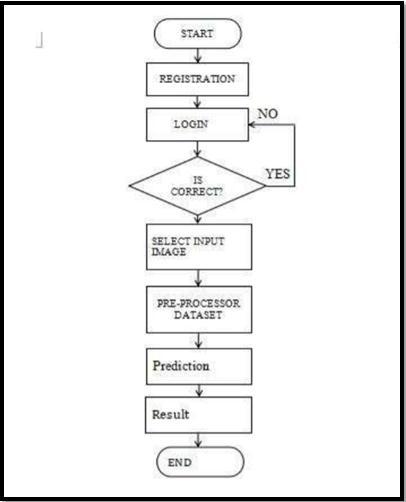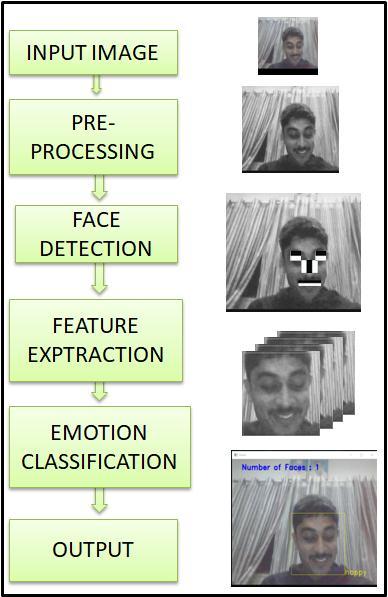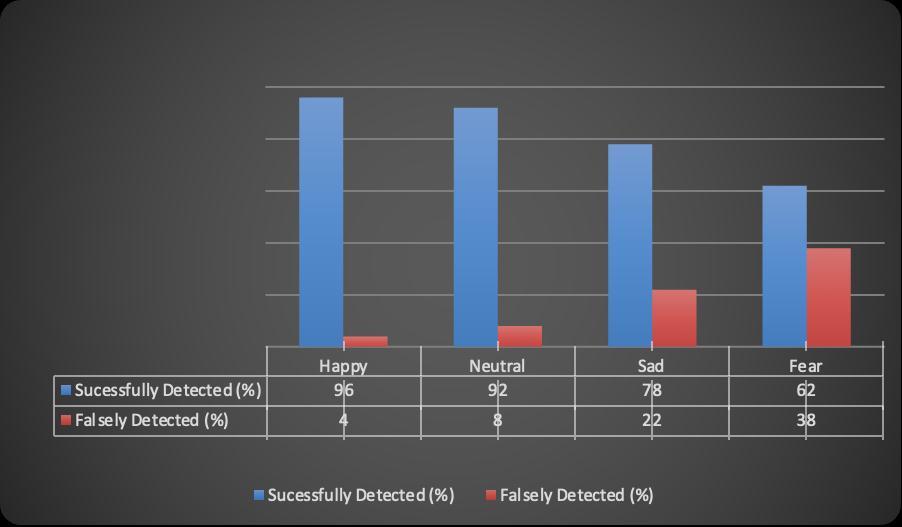Emotion Detection Using Facial Expression Recognition to Assist the Visually Impaired
Pradnya Nair1, Shubham Moon2, Tushar Patil3 , Dr. S. U. Bhandari41,2,3 B.E. Students, Electronics and Telecommunication Engineering, PCCoE
Abstract - We are living in the most defining period of Human history and growing at a pace faster than ever before. This growth witnesses theparticipationof machinesinmaking human life easier and thus there is an increased interaction with machines. As a matter of fact today a human interacts with a machine more than a fellow human being. Hence in the given scenario this project aims at providing machine the ability to understand the human emotion based on the facial expression. The project proposes to use austere machine learning algorithm to establish the result by dividing the project into broadly three stages. The three stages are recognised as face detection, facialdata extractionfollowed by expression recognition.
Key Words: Feature Extraction, Haar-cascade, Real-time video capture, Audio message
1. INTRODUCTION
Forhumansitis quite easytounderstandan emotion but difficultforacomputerora machinetodoso.Thehuman emotions are broadly classified into seven categories Neutral,Happy,Fear,Sad,Surprise,AngryandDisgust.This project successfully detects four emotions specifically Neutral, Happy, Sad and Surprise. With the magnitude of developmentthehumanraceisexperiencingtheneedand the importance of automatic emotion recognition has increased.Facialexpressionisthemostprominentindicator of the emotion possessed by human, other features of expressionrecognitionbeingvoicerecognition,eyeactivity, heart rate monitoring, motion analysis etc. However, the facial expression is the best indicator and indeed a major signoftheemotionthehumanbeingissubjectedtointhe moment. The project is hardware implemented using the Raspberrypi3b+withaweb-cameratocapturetherealtime video for detection and classification the emotion being detectedintherealtime.
1.2 Objective and Scope of the Project

The machines are being integrated into the daily life of human beings at pace faster than ever before. In such a circumstanceamachinecapableofunderstandingthestate ofmindofanindividualwouldbeawelcomeassistance.This informationcanindeedbeextendedtoaplethoraoffields,
for example, the healthcare sector to aid the healthcare providers better quality of service to cater the needs of a patient unable to express his state of mind by explicit communication, this mode of machine based emotion detectioncanbeusedbyretailworkerstounderstandthe customer feedback and therefore give a better quality of assistance.
All these instances successfully establish the scope of this projectwithasoleobjectiveofsuccessfullyestablishingthe underlyinghumanemotionbyaccuratedeterminationofthe facialexpression.
1.3 Literature Survey
Inconclusionoftheliteraturesurveycarriedouttheteam hasnarroweddowntousethemachinelearningalgorithmof cascade classifier for location of the faces and eventually detect the emotion by making use of appropriate . As an additiontotheexistingsystemtheteamalsoevaluatedthe need of sending out an audio message of the detected emotion through facial expression which would aid in helpingthevisuallyimpairedwhicheventuallywouldcater forspeciallyablepeoplefromallwalksoflife.
The decision to use machine learning based cascade algorithmisaconclusiondrawnfromthesurveyasitisan algorithmwhichidentifiesfacesinanimage/realtimevideo. This algorithm basically uses edge and line detection featuresproposedbyViolaandJonesintheirresearchpaper “RapidObjectDetectionusingaBoostedCascadeofSimple Features” published in 2001. Cascade, the ML based algorithmmakesuseofagargantuanamountofconsistingof bothpositiveandnegativeimages.Thesaidpositiveimages areknowntocontainallthethatisthesubjectofinterestto theuserwhilethenegativearetheimagesofalltheentities thatareofobjecttheuserdoesn’twishtodetect.
Thefacedetectionoperationisperformedbyusingaseries of classifiers and algorithm which determines if the given imageis positive(a human facein ourcase)ora negative image(notahumanface).Toachievethedesiredprecision ofdetectiontheclassifierneedstobetrainedwitharound thousandsofimageswithorwithoutcontaininganyface.
2. SYSTEM DESIGN
2.1 Block Diagram


Automatic facial expression recognition is a procedure performed by machine which can be broadly classified to consiststhefollowingsteps:

1.Capturingtheimageviaaweb-camera
2. Pre-Processing of image: This stage subjects the input image to various processing like Reduction of noise, Conversion of image to Gray scale, Pixel Brightness Transformation

3. Detecting the faces in the real time scene: The system detectsmultiplefacesinthesceneandattemptstoembark theirlocation.Thismajorlyistheinputofthesystemasthe ultimatemotiveistodetecttheemotion
4.FacialFeatureExtraction:Thisistheprocessofextracting facialfeatureslikemouth,nose,eyes,lips
5. Emotion classification : The detected faces are thus classifiedintotheemotionaspertraining
4. MATHEMATICAL MODELLING
Algorithm: DETECTION AND RECOGNITION
INPUT: Image Samples { Im1 , Im2, Im3 ,Im4 ……….}
OUTPUT: Detection of Face and Associated
Expression
Step00: BEGIN
Step01:Inputsampleimages(usingwebcamera)
Step02:Readandstoreframe F=
Step03:DefineClassifier
Step04:Readcontentsofxmlfile
R=face_data.xml
Step05:Pre-preprocessing
[1] Grayscaleconversion:
G(x)= AverageValue
G’(x)=0.299R+0.587G+0.114B
WeightedValue
[2] NoiseCancelation:
PG(x)= √
Step06:
i={1,2,3,4….n} [Stages of Cascade]
i=0
While i<n(No.ofStages)
STARTLOOP
InitialiseWeight
NormaliseWeight
GotonextWeakclassifier
EvaluationDetectionQuotient

CombineWeakClassifier
Outputclassifierconclusion
Step07: END OF ALGORITHM
5. EXPERIMENTAL CONCLUSION

Asimilarexperimentisconductedforotherfouremotiondetectedbythesystemandtheobservedresultsareusedtoplotthe confusionmatrixforthemulticlassdata.
4: Graphical Representation of Confusion Matrix
Usingthedataobtainedfromtheexperimentationtheteam performed mathematical calculations as showm below to determine the accuracy, precision and recall value for the system.
Precision:Numberofcorrectlypredictedeventoutofallthe consideredevents
Recall:Numberofcorrectlypredictedoutofactualevents
6. CONCLUSIONS
The proposed system puts forth an accurate method for detection of emotion using machinelearning approach by implementation of cascade classifier. This system differentiates itself from the others by giving an audio messageofthedetectedemotion.

Theprojectalsosuccessfullydetectsmultipleimagesinreal time in a single frame a gives out promising results. The designed system implements a simple strategy and thus helpsinrapidrecognition.
REFERENCES
[1] PaulViolaMichalJones(2001),“RapidObjectDetection usingaBoostedCascadeofSimpleFeatures”,Accepted ConferenceonComputerVisionandPatternRecognition
[2] CharviJain,KshitijSawant,MohammedRehman, Rajesh Kumar“EmotionDetectionandCharacterizationusing FacialFeatures”,IEEE

[3] ShervinMinaee,AmiraliAbdolrashidi,“Deep-Emotion: Facial Expression Recognition Using Attentional Convolutional Network”, Expedia Group University of California,Riverside
[4] Navachethana,ShwethaKumari,Dr.VenkateshShankar, “Recognizing Emotions on Face using Haarcascade Method”,IRJET
[5] RohanShukla,AgilandeeswariL,PrabukumarM“Facial EmotionRecognitionbyDeepCNNandHAARCascade”, IJITEE
[6] NishantHariprasadPandey,Dr.PreetiBajaj,Shubhangi Giripunje, “Design and Implementation of Real Time FacialEmotionRecognitionSystem”,IJSER

[7] Komala K , Jayadevappa D , Shivaprakash G, “Human EmotionDetectionAndClassificationUsingConvolution NeuralNetwork”,EJMCM
[8] Bharath Surendar I , P Sri Siddharth Chakravarthy , Roshini Thangavel , Swarnalatha P, “Facial Feature AnalysisusingDeepConvolutionalNeuralNetworksand HAAR Classifier for Real-Time Emotion Detection”, IJERT
[9] Luz Santamaria-Granados Mario Munoz-Organero Gustavo Ramirez-González, (2018), “Using Deep ConvolutionalNeuralNetworkforEmotionDetectionon aPhysiologicalSignalsDataset(AMIGOS)”,IEEE
[10]Prof. V.D. Bharate, Shubham Sunil Phadatare, Suhas Panchbhai, Vishal Pawar, (2017), “Emotion Detection usingRaspberryPi”,IRJET
[11]Navjot Rathour, Anita Gehlot, Rajesh Singh , (2019), “TrainingofmachinelearningalgorithmisdonebySVM inordertoproceedtowardsfacialemotionrecognition”, IRJEAT
[12]PawełTarnowski,MarcinKołodziej,AndrzejMajkowski, Remigiusz J. Rak, (2017), “Emotion recognition using facialexpressions”,ICCS
[13]V.D.Punjabi,HarshalMali,SuchitaBirari,RohiniPatil, AparnaPatil,ShubhangiMahajan,(2019),“Predictionof HumanFacialExpressionusingDeepLearning”(IRJET)
